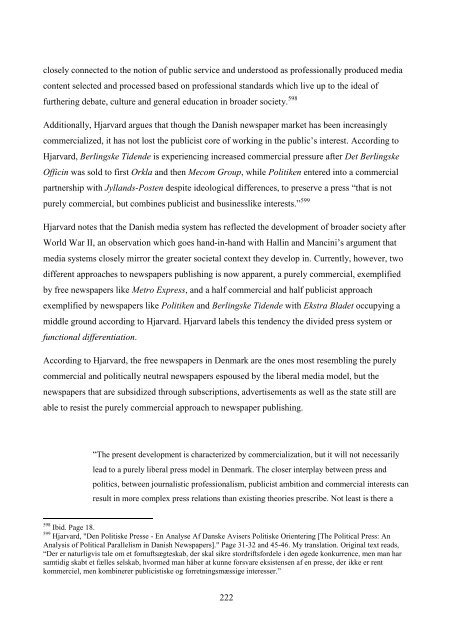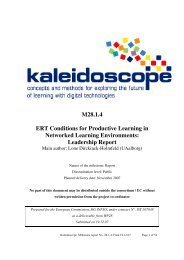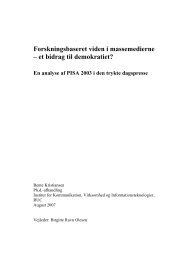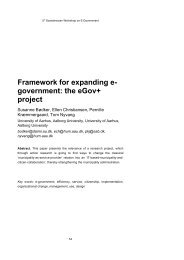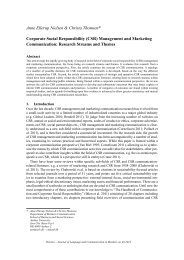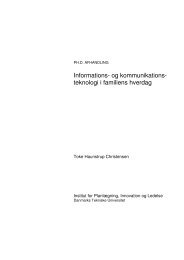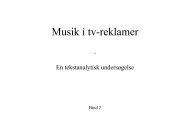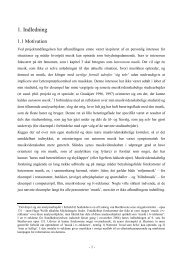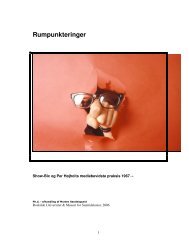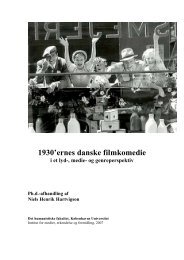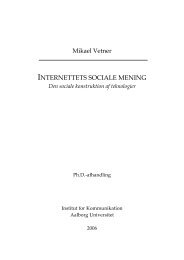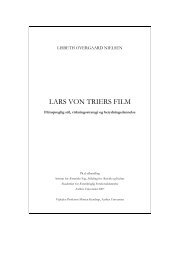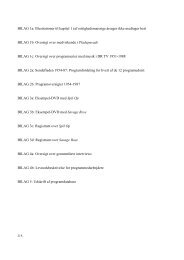The Jeremiad Over Journalism
The Jeremiad Over Journalism
The Jeremiad Over Journalism
Create successful ePaper yourself
Turn your PDF publications into a flip-book with our unique Google optimized e-Paper software.
closely connected to the notion of public service and understood as professionally produced media<br />
content selected and processed based on professional standards which live up to the ideal of<br />
furthering debate, culture and general education in broader society. 598<br />
Additionally, Hjarvard argues that though the Danish newspaper market has been increasingly<br />
commercialized, it has not lost the publicist core of working in the public‘s interest. According to<br />
Hjarvard, Berlingske Tidende is experiencing increased commercial pressure after Det Berlingske<br />
Officin was sold to first Orkla and then Mecom Group, while Politiken entered into a commercial<br />
partnership with Jyllands-Posten despite ideological differences, to preserve a press ―that is not<br />
purely commercial, but combines publicist and businesslike interests.‖ 599<br />
Hjarvard notes that the Danish media system has reflected the development of broader society after<br />
World War II, an observation which goes hand-in-hand with Hallin and Mancini‘s argument that<br />
media systems closely mirror the greater societal context they develop in. Currently, however, two<br />
different approaches to newspapers publishing is now apparent, a purely commercial, exemplified<br />
by free newspapers like Metro Express, and a half commercial and half publicist approach<br />
exemplified by newspapers like Politiken and Berlingske Tidende with Ekstra Bladet occupying a<br />
middle ground according to Hjarvard. Hjarvard labels this tendency the divided press system or<br />
functional differentiation.<br />
According to Hjarvard, the free newspapers in Denmark are the ones most resembling the purely<br />
commercial and politically neutral newspapers espoused by the liberal media model, but the<br />
newspapers that are subsidized through subscriptions, advertisements as well as the state still are<br />
able to resist the purely commercial approach to newspaper publishing.<br />
―<strong>The</strong> present development is characterized by commercialization, but it will not necessarily<br />
lead to a purely liberal press model in Denmark. <strong>The</strong> closer interplay between press and<br />
politics, between journalistic professionalism, publicist ambition and commercial interests can<br />
result in more complex press relations than existing theories prescribe. Not least is there a<br />
598 Ibid. Page 18.<br />
599 Hjarvard, "Den Politiske Presse - En Analyse Af Danske Avisers Politiske Orientering [<strong>The</strong> Political Press: An<br />
Analysis of Political Parallelism in Danish Newspapers]." Page 31-32 and 45-46. My translation. Original text reads,<br />
―Der er naturligvis tale om et fornuftsægteskab, der skal sikre stordriftsfordele i den øgede konkurrence, men man har<br />
samtidig skabt et fælles selskab, hvormed man håber at kunne forsvare eksistensen af en presse, der ikke er rent<br />
kommerciel, men kombinerer publicistiske og forretningsmæssige interesser.‖<br />
222


